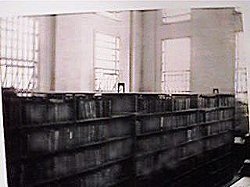| ||
|
These term paper tips are written in response to the many questions which I receive from students. Often I get notes saying "Send me everything you've got on Alcatraz." That's a big question, so my first piece of advice is * Be specific about what you are going to write about. That depends a lot on what you can find. This web site is one answer. There are other answers out there, too. Your library is nearly always the best place to start. Reading through this web site and through books about Alcatraz will give you some idea about what to do. In choosing your topic keep in mind the requirements of the assignment. But don't forget this second piece of advice: * Choose something that is fun for you. There are lots of good Alcatraz topics out there. You could write about Alcatraz as a military fortress. There are plenty of exciting escape attempts. (Did Cole and Roe make it?) Many people have seen a movie about Alcatraz and wondered how much of it is true. There's another good topic for a term paper -- how true are these movies? What are the real facts? Then go one step further. Ask why the movies were made in this way. As you research, be sure to * Take a lot of notes. Follow leads.Try to think ahead to what the tough arguments against your ideas will be and prepare to answer them with evidence. There are lots of tools available in nearly every library which can help you find out more about Alcatraz. These include:
Your librarian can suggest other good resources. When you are doing your research, be sure to answer all the questions. If you are writing about Al Capone, don't just say "He got sick." Find out what made him sick. Use the library and your online resources to discover what this disease did to him. It makes for a more interesting report and that makes for a better grade, too! Now for a quick comment on online resources. You probably know all about search engines. My favorites are Yahoo and Excite. There are also many others. (To visit a page with nothing but search engines, click here.) When you find pages about the subject, be sure to check their list of links for those sites which the search engines missed. As you do your research * Write down the specific questions you have and ask them of someone who might know the answer. Lots of people who write to me never read the web site or any books before they ask me a question. I'll tell you where to look, but my most interesting responses will come when you have learned your way around the web site a little and found some things that puzzle you. This is when you really get to learn things and this is when learning becomes fun. * When you are ready to write, write what you know about in your own words. Tell it all. This is the secret of good writing. You tell what you know. The more you have done your research, the more you will know, so don't skip the steps before this one. Find out everything you can and then tell the teacher or the professor the story of what you have found. Pay attention to grammar and your presentation. Cite quotes correctly. (For information on citing electronic documents, click here.) Many of the documents you find on my site come from archives. Check the lower right hand corner of the page for the source and be sure to include this in your footnotes and bibliography when you use these documents. Remember, the keys are to have fun and to chase down the facts. If you do these things first, you will have the makings of a great paper. Joel GAzis-SAx |
